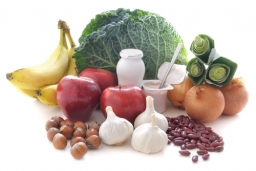Time to do a gut check on probiotics and sport
Wednesday, April 19, 2017 - 09:21

Participation in sport and physical activity has always been associated with health and wellness. And athletes are commonly looked upon as examples of good health and fitness. However, athletes that train and compete at high intensity levels are often at greater risk for succumbing to illness due to a vulnerable immune system. Making sure to maintain a healthy nutrition, sleep and recovery plan to balance training levels goes a long way to keeping athletes healthy. Gut and intestinal health can be improved by making sure that an athlete consumes adequate amounts of probiotics in their diet. Probiotics are healthy or good bacteria that multiply in the colon to help keep a proper balance of good and bad bacteria to maintain intestinal health. Probiotics are live microorganisms; the most common types found in foods are Lactobacillus and Bifidobacterium which have also been shown to be the most effective.
Benefits of probiotics for athletes:
- Improved recovery– Eating probiotics during recovery increases antioxidant absorption and promotes extra free radical fighting. Ingesting probiotics may help reduce post-exercise muscle inflammation and muscle damage.
- Better immune function – Promotes higher levels of interferon, a natural virus fighter. Interferon levels are usually decreased in fatigued athletes which puts them at risk for illness. Studies show that probiotics are beneficial in preventing acute upper respiratory tract infections and can reduce the number of symptom days and symptom severity.
- Improved digestion – Athletes require a diet high in nutrients to meet the needs of training and competition. Healthy bacteria help increase the bioavailability and absorption of proteins and fats by improving the digestion of these nutrients in the stomach and intestines. Probiotics can also help reduce nausea, intestinal inflammation, bloating and hypersensitivity to foods which are more common in athletes training at high intensity.
- Improved heat tolerance – Research claims that ingestion of probiotics can increase the amount of time it takes for athletes to reach fatigue in the heat.
- Improved efficiency of aerobic exercise – Healthy bacteria located on the back of your tongue can help convert nitrates from food into a form that aids efficiency of aerobic exercise. Many athletes consume nitrate-rich beet juice prior to competition for just this reason. Athletes also tend to avoid mouthwashes that often kill off good tongue bacteria.
While probiotics can be taken in supplement form, natural sources of probiotics often contain higher numbers of healthy bacteria. Probiotics can be found through natural, fermented foods and drinks such as:
- Yogurt (plain or Greek-style)
- Kefir
- Kombucha
- Miso
- High quality aged cheese
- Sauerkrauts
- Kimchi
This is also a case of more may be better. Eating more quantities of probiotics as well as a greater variety of probiotics may improve their effectiveness. As always though, when making any changes to your nutrition or diet you should consult with a nutrition expert to make sure that you are meeting the needs of your individual training and competition context.
Sources:
(2016). The Pros of Probiotics. Eat Right Ontario. [French: (2016). Les avantages des probiotiques. Saine Alimentation Ontario.]
Gleeson M. (2014). Probiotics – The Benefits for Athletes. Health Span.
Hutchinson A. (2015). The Athlete’s Guide to Probiotics. Outside.
Jennings K. (2014). 3 Reasons Athletes Need Probiotics. Active.com
Mercola J. (2016). Can Probiotics Help Athletic Performance? Peak Fitness.
Pyne, D. B., West, N. P., Cox, A. J., & Cripps, A. W. (2015). Probiotics supplementation for athletes – Clinical and physiological effects. European Journal of Sport Science, 15(1), 63-72.